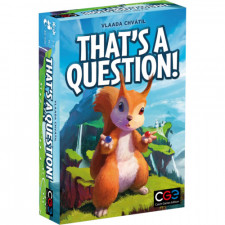That's a Question! Review
on Sep 6, 2017
The cover to That's A Question! shows a squirrel holding a blue pill in one hand and a red one in another. This image, perhaps from a fevered dream, is all you need to know about the game. You have two options. Pick one.
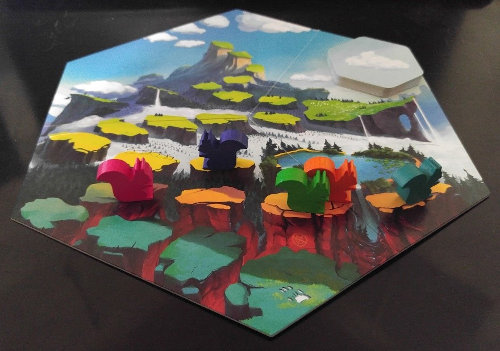
Pieces so adorable that you forget to ask why this game has squirrels in it.
Played at junior high sleepovers for decades, That's A Question! is essentially “Would You Rather?†with a speckle of scoring to gamify things. Players are dealt hexagonal cards, split into three sections that correspond to the central board’s questions: “What would you miss more if it ceased to exist?â€, “Which of these would you choose?â€, and “Whom do you consider worse?†On your turn, you choose your favorite friend or family member, two of the five cards in your hand. You slap them down on the matching color space and voila! You’ve made a question. As the answerer debates whether they would rather predict the future or know all the languages in the world, the rest of the table places bets on what they will say. Instantly, you hear sharp inhales as everyone hems and haws between the two answers. Others aren’t just involved; they’re invested. When the answerer says they’d rather know all the languages in the world, half the table cheers, applauding themselves for knowing that person so well. The other half of the table boos the choice, trying to convince the answerer that being clairvoyant is handier than a sports almanac from the future.
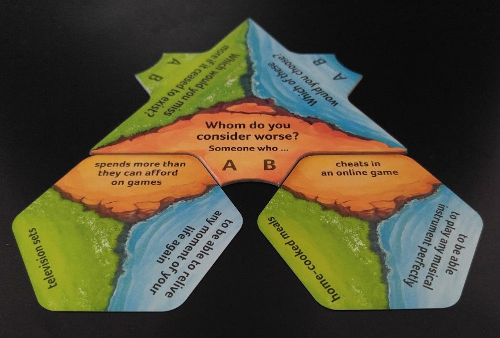
I think we all know which one is worse.
As everyone argues over the merits of one answer versus another, someone is going to have to do the somewhat fiddly work of adjusting score track. The answerer automatically gets a point just for being in the hot seat. Those who bet correctly receive one point, those who bet incorrectly receive no points, and the asker gets a point for each incorrect guess. This scoring provides a modicum of strategy in the game. There is some thought as to whom you’re asking a question and what options you’re giving them. That’s A Question! lives in the Goldilocks zone of juuuuust right. If you know someone hates broccoli and loves chocolate, don’t not ask them which they would miss more if it ceased to exist. The answer is obvious and you’ll earn no points. Instead, being in that fuzzy gray zone makes things far more interesting and, if you can make a question a little bit weird, that’s even better. Which would you miss more if it ceased to exist: horses or stuffed animals? You may have never considered this before and might not even have feelings on the matter, but it’s time to take a side. Watch gleefully as you see everyone else around the table struggling to guess how you’ll reason about this bizarre proposition.
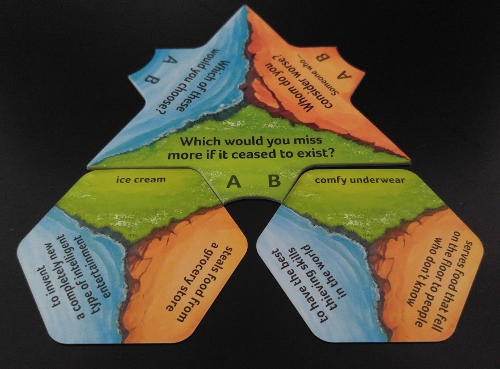
Two of life’s finer things.
Ultimately though, no one is going to think too much about it. That’s A Question! is much more of a conversational activity than it is a contest to see who can demonstrate their superior wit. If you go in with that expectation, then the experience can be rather entertaining. Every question provokes some kind of discussion. I had to vehemently defend myself to my family as to why someone who “takes up two parking spaces when they park†was worse than someone who “steals a handful of coins from a blind panhandlerâ€. (Look, in all likelihood, those two things are probably done by the same person, but I had to pick one.) Depending on the level of discourse you want to have and how many deep dark secrets you want to reveal, the game is best when played with 4-5 people you’re comfortable being yourself around. Sure, it could work as an icebreaker given the right group, but I’m not sure the best introduction to a stranger is admitting you’d rather have nice-smelling farts over being the best cartoonist in the world. Plus, the fun of tailoring specific questions to specific people would be missing. Without this significant part of the experience, there’s not much left to the game.
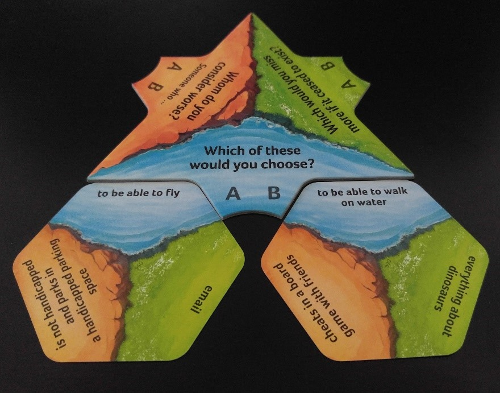
Either one would be convenient.
In a sea of light social games, That’s A Question! makes more of a ripple than a splash. The basis of the game isn’t revolutionary and the selection of cards in your hand does not always pair well. Scoring isn’t necessary. The game doesn’t engender any real sense of competition. These flaws will be glaring for those who want more of a game-like experience. I’m willing to overlook these shortcomings only because of the shared memories and inside references that the game creates. I appreciate learning new things about my loved ones, even if they do think writing in a library book is worse than cheating in a board game.

 Customer Support
Customer Support  Subscribe
Subscribe 




 Account
Account  Wishlist
Wishlist 
